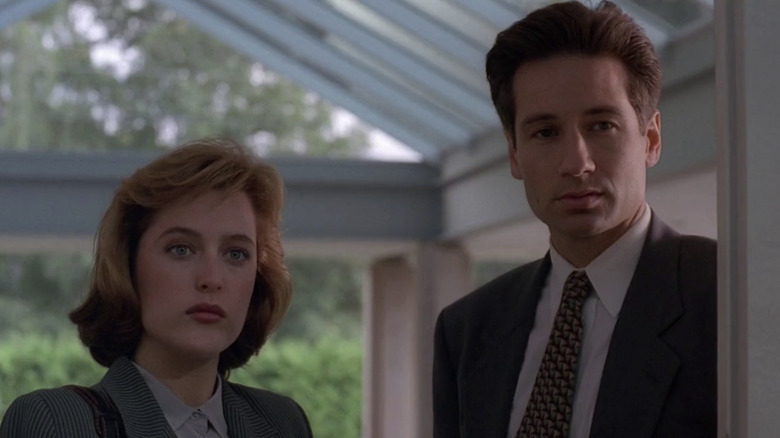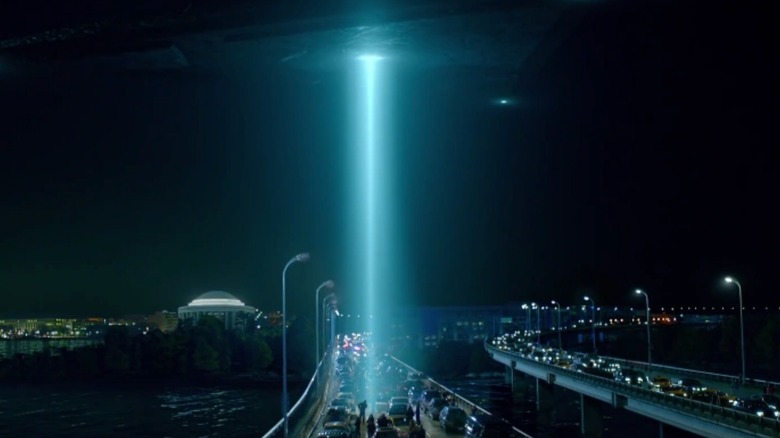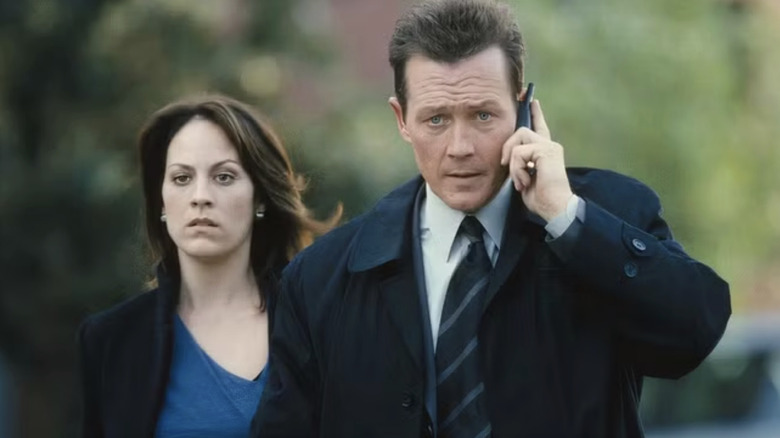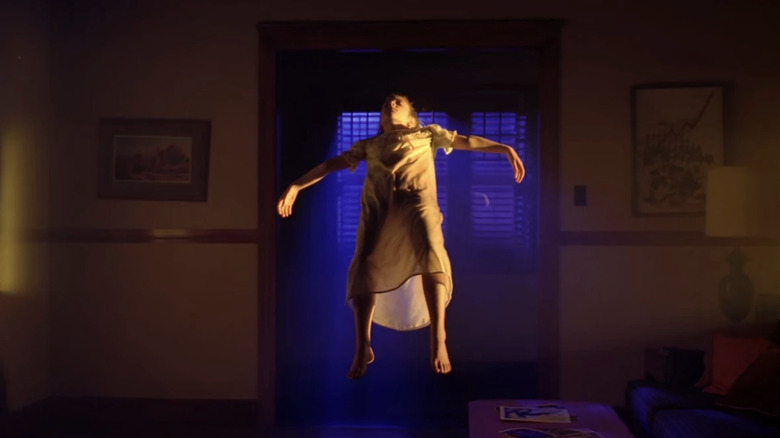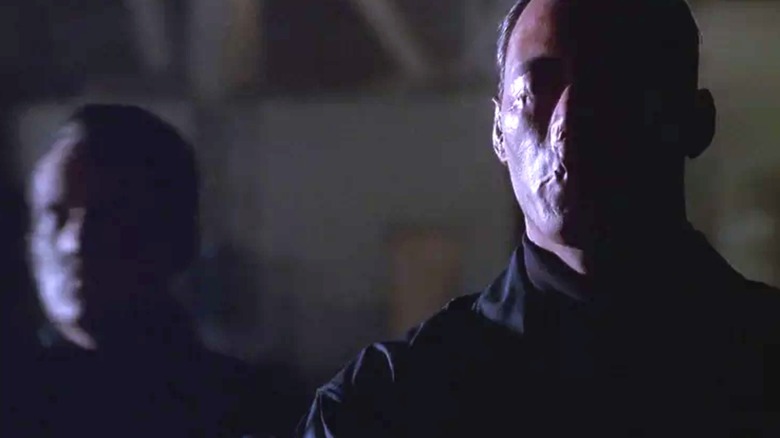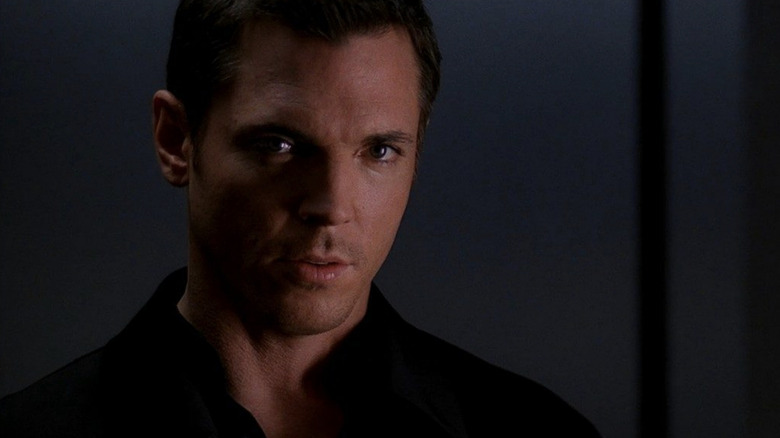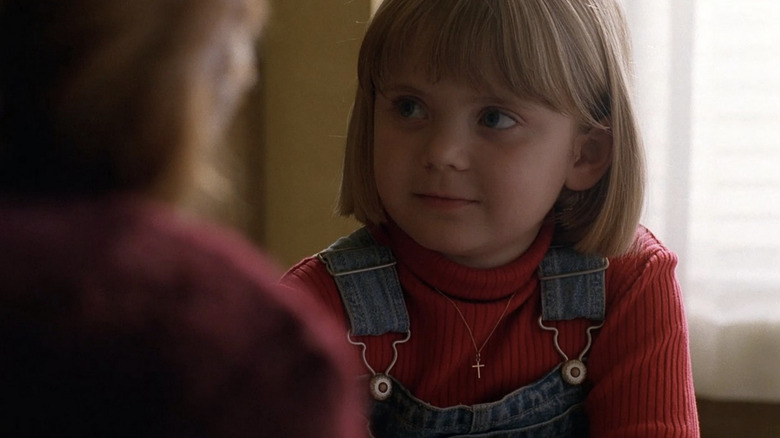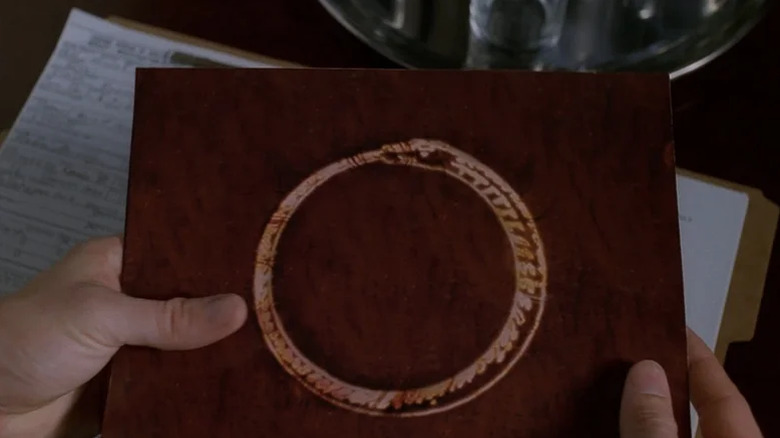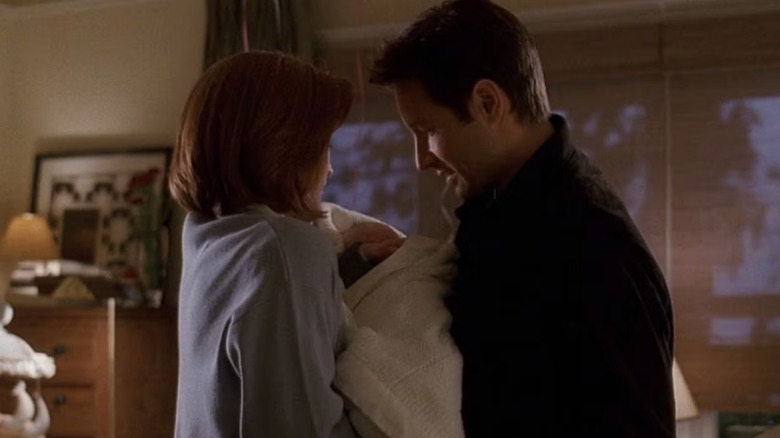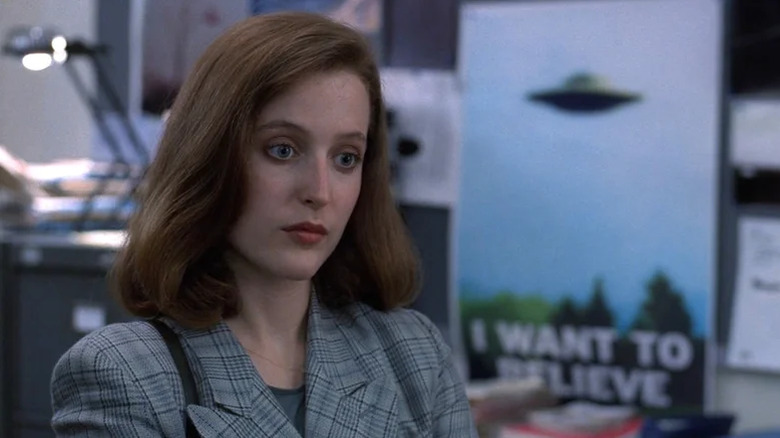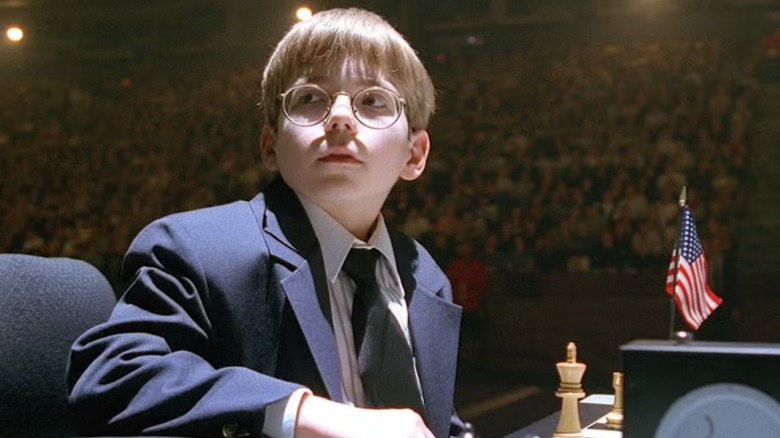10 X-Files Storylines That Never Paid Off
When "The X-Files" first began back in 1993, it's unlikely that anyone truly understood the cultural phenomenon that Chris Carter had created. David Duchovny and Gillian Anderson became household names as audiences flocked to Fox every Friday night (and later Sunday) to see what strange and impossible cases FBI agents Fox Mulder and Dana Scully would investigate next. The show tackled everything from UFO sightings and alien abductions to demonic schoolteachers and parasitic monsters hiding in the sewers. There was nothing too weird, too outlandish, or too macabre for this duo, and for nearly a decade the show ran uninterrupted on the network.
But in a day and age where Ryan Coogler may be rebooting "The X-Files," one must think back on the original series — including the two feature films and the two revival seasons, which aired between 2016 and 2018 — and wonder: Did the show actually wrap everything up? Well, in true "X-Files" fashion, there were plenty of mysteries and plotlines that were never truly solved. In fact, there are large aspects of the mythology in particular that still don't fully add up. More than that, some storylines just didn't pay off terribly well, with certain characters and events left forgotten both times the show came to a close.
If you're anything like us, then you also believe the truth is out there. Unfortunately, "The X-Files" never got to wrap up with a big spectacular finish that tied up everything into a neat bow. With that in mind, here are some of those stories that we wish were better wrapped up, or at least more properly explained.
The prophesied 2012 alien invasion
In the original "X-Files" series finale, Season 9's two-part "The Truth," Mulder is court-martialed after a season-long absence after he discovers the truth behind the global alien conspiracy. In his search, he learns that the Syndicate's collaborations with the alien Colonists were to be fulfilled on December 2012, the end of the Mayan calendar. This aired back in 2002, so it still seemed possible that an alien invasion might occur in a decade. But after the 2008 film "The X-Files: I Want to Believe" didn't address the invasion plans, fans hoped a potential third movie might. Instead, the date came and went with a whimper.
By the time "The X-Files" returned in 2016, the 2012 deadline was explained away as an issue of "climate change." In the Season 11 premiere, "My Struggle III," Mulder and Scully discover from former Syndicate members that the aliens moved on from Earth due to its depleting resources. Yet, the Cigarette Smoking Man (William B. Davis), aka CSM, continues to work on a depopulation project to then continue this invasion? It's all a bit confusing and a clear example of "The X-Files" starting something that it could never pay off.
What's especially frustrating about the 2012 invasion date is that the show could have easily found ways to work around it. Black oil could have returned to infect the population, thus invading the Earth in a way that Mulder and Scully didn't expect, or maybe the aliens needed to stall their plan, but none of that happened. Oh well, maybe the reboot will finally get around to it ...
Mulder and Scully's multiple replacements
Several times throughout "The X-Files'" run, Mulder and Scully were in danger of being replaced. While David Duchovny and Gillian Anderson are the end-all-be-all of paranormal FBI duos, things changed when Duchovny took a step back from the show. Despite the claims that he left for good, one behind-the-scenes fact about "The X-Files" is that he never fully left at all, still appearing in over a dozen episodes before the show's initial run ended. Still, Mulder needed to be replaced in the day-to-day, and so Robert Patrick's John Doggett was introduced to fill the void.
The last two seasons of "The X-Files" slowly phased Mulder and Scully out of X-Files fieldwork and pushed Doggett and Monica Reyes (Annabeth Gish) into their roles instead. While the new duo were no Mulder and Scully, they worked quite well together, suggesting that "The X-Files" may be able to exist without its leading stars. However, when the show came back in 2016, Doggett and Reyes were (mostly) left behind, and Agents Kyd Miller (Robbie Amell) and Liz Einstein (Lauren Ambrose) were introduced as the new "The X-Files: The Next Generation."
But just like the previous replacements, these two ended up left on the cutting room floor. For all the times that the series tried to expand the X-Files Division beyond Mulder and Scully, nothing ever seemed to stick. To this day, we have no idea what became of Doggett, and Reyes' unceremonious downfall in Season 11 was beyond disappointing. Like many characters on the show, all of Mulder and Scully's would-be replacements were either forgotten or grossly misused as time went on.
Mulder finding his sister
From the beginning of "The X-Files," Mulder's entire quest for the truth is based the abduction of his sister Samantha when they were children. This event infused young Mulder with a passion for uncovering secrets, one that ultimately led him to The X-Files. But although Mulder's sister was an important plot point early on in the series, it was clear that the show didn't quite know where it wanted to go with her. Various clones of Samantha were introduced in the show's early years, many of whom claimed to be the real deal, but nothing ever came of it — Mulder never actually saw his sister again.
Instead of paying off Mulder's hunt for the truth and reuniting the siblings, Season 7's "Closure" reveals that Samantha had been dead for years. Rather than living her days with her brother, she was taken by the Syndicate to a new home where she grew up and was raised by the CSM alongside her half-brother Jeffrey Spender. Even worse, she was abducted again on several other occasions, ultimately leading to her death. It's a very strange and underwhelming way to end a lifelong search for one's sister. More than anything, it felt like "The X-Files" didn't know how to end its most important motivator.
While it was good that Mulder found some eventual closure, it was never terribly satisfying for fans. Frankly, it didn't turn out terribly satisfying for Mulder either, who still struggled with the fact that he couldn't save his sister in the "I Want to Believe" feature film years later. Guess that's what happens when you don't bring a story to a more appropriate close.
What happened to the Alien Rebels?
By the time "The X-Files" was into its Season 5, the show began to introduce multiple factions of alien lifeforms, but perhaps the most interesting were the faceless alien beings known only as the "Alien Rebels." These rebels were the anti-Colonists, who aimed to keep their extraterrestrial brothers from world domination. These beings were faceless to keep themselves free of the black oil virus that the Colonists used to enslave the rest of the galaxy, a virus that had made its way to Earth. But after only a handful of appearances, the Rebels were never heard from again.
The show's original series finale, "The Truth," reveals that the Alien Rebels had killed all the non-CSM members of the Syndicate back in Season 6 (arguably the show's best season) but later seasons would prove this false. It always felt odd that the Alien Rebels didn't finish the job, and considering the way the conspiracy shifted to the Super Soldier plotline in Season 9, their absence as an opposing force to the continuing invasion plans never quite made sense.
What's worse is that come Season 10, Mulder is told that the Alien Rebels were a hoax all along, a distraction meant to pull him from the true conspiracy: human depopulation. It was bad enough that the Rebels never returned to further aid Mulder and Scully against the alien-allied conspirators, but to retcon them as a lie all along? The revival never offered any real answers, instead only asking the question without any fact-checking involved.
Krycek's nanotech
In Season 6's "SR-819," we learn that Alex Krycek (Nicholas Lea) has poisoned Walter Skinner (Mitch Pileggi) in order to infiltrate the FBI and spy on Mulder and Scully from afar. When Skinner asks the assassin what he wants, Krycek simply replies, "All in good time." But for all the trouble that Krycek goes through to secure Skinner's allegiance, the whole thing comes across as, well, overkill. All Krycek ever did was have Skinner record the agents without their knowledge, which didn't amount to much in the end.
Of course, "wasted potential" was kind of Alex Krycek as the whole. Every time he was vital to the plot, he was left for dead in an abandoned warehouse with a UFO or left behind in Russia, where his arm was sawed off. Krycek was a villain we all loved to hate, but the nanovirus idea was a bit of a swing and a miss — especially since Krycek could have used the threat to have more of a sway over the entire X-Files Division. Instead, the CSM puts him in a Tunisian prison several episodes later.
The only other time this plotline is brought up explicitly is in Season 8. When Krycek returns, he blackmails Skinner and forces him to try and keep Scully's baby from being born. However, the whole thing backfires come the season finale, "Existence," when Skinner shoots Krycek dead. To this day, those nanobots are still in Skinner, and it's a wonder why the revival seasons didn't use that as a bargaining chip for the CSM and Reyes to pull the Assistant Director to their cause. It would've been more interesting than the excuse the show conjured.
Scully's biological daughter
Early on in "The X-Files," Scully is abducted and later returned with the terrible news that her ova has been stolen. Now barren, Scully comes to terms with the fact that she won't be able to have children in the future. But in a two-part holiday-themed arc in Season 5 ("Christmas Carol" and "Emily"), we learn that Scully's stolen ova was used to create Emily Sim (Lauren Diewold), a young girl who is actually her biological daughter. Scully is conflicted about this Christmas miracle but vows to raise Emily as her own. Unfortunately, that wasn't meant to be.
When Emily falls sick without her regularly scheduled Syndicate treatments, there is no cure. Eventually, the girl dies, and Scully is forced to bury her not long after meeting her. It's quite tragic and not something that any parent would likely be able to get over. But aside from a brief hallucination in "All Souls" later that season, Emily is never spoken of again. When Scully discovers that Emily's casket is empty, and that her body has been taken as evidence, there is no trail left to follow. But it does seem odd that this is where the plotline stops.
Considering all the clones of Mulder's sister that appeared early on in the series, it seems highly likely that Scully may have other Syndicate-made children out there. But rather than explore that thread further (or even try to get to the bottom of Emily's creation), the show pivots to the William plot in Season 8, which carries through the rest of the show.
Did Mulder and Scully stop the Millennium Group?
Okay, this one is admittedly a bit of a cheat, but since the television series "Millennium" technically concluded on the "X-Files" episode of the same name, we'll count it. At the height of "The X-Files," Chris Carter created another one of the best sci-fi shows of the '90s that followed former FBI profiler Frank Black (Lance Henriksen) as he investigated cases for the mysterious Millennium Group. As it turns out, the Group had some fantastical ideas about bringing about the biblical Apocalypse, with Frank caught in the middle of two factions at war with one another.
Although "Millennium" was cancelled after three seasons, the show ended just before 2000, so to round out the show's main premise, "The X-Files" brought Frank back in Season 7 to finish the story. Here we learn that one member of the Group plans to use four resurrected members (zombies) as his own "Four Horsemen of the Apocalypse" to bring about the end on New Year's Eve, but the whole thing is a bit of a convoluted mess. In the end, it's unclear if Mulder, Scully, and Frank actually defeated the Millennium Group's plans for the new century — but since this conspiracy was so connected to the year 2000 the same way the alien invasion was to 2012, we're not sure what else they'd cling to.
Still, "Millennium" fans certainly want more, and in 2015, IDW Publishing released a five-part comic series titled "Millennium" where Frank and Mulder team up once more to defeat the Group — who have returned with Frank's daughter Jordan at their side. While the comic isn't exactly canon, it reminds us that this story was never truly completed, even if Frank Black feels free from the Group's pull.
William, alien messiah
Perhaps the biggest letdown in all of "The X-Files" is everything about William Scully, the boy later known as Jackson Van De Kamp (Miles Robbins). After Scully teased her pregnancy at the end of Season 7, much of the Season 8 surrounds William's birth. There has been debate about whether this was done through a "divine hand," as is posited in Season 8's "Essence," or directly through the Smoking Man's intervention in "En Ami" (as he claims in "My Struggle III"), but what's undeniable is that this human-alien hybrid was meant to be the start of something greater.
For the Syndicate, William was the template for the next evolution of humanity, one that would coincide with the Colonists' vision for their new world. Various groups believed the same, including the cult in Season 9's "Providence." But by the time the revival seasons come around, the entire "X-Files" mythology is rearranged in a way where William (though still vastly important) doesn't amount to anything. His apparent death at the end of the confusing series finale, "My Struggle IV," seems to end the conspiracy's plans for him.
Admittedly, William does live after the CSM shoots him, but he goes into hiding, with Mulder and Scully barely mourning their son in favor of a new child that Scully is revealed to have conceived. The whole thing is frustrating because the final four seasons of the show seem to be building toward William being the bridge between two species that can save the world from the alien Spartan virus, only for the show to move on the first chance it gets. Talk about a letdown.
Is Scully actually immortal?
Another big question "The X-Files" often asked but never spent much time meditating on was whether Dana Scully is actually immortal. The revival seasons even joke about this in "Mulder and Scully Meet the Were-Monster," but the show generally leaves it there for fans to play with rather than treating it as something to be resolved. The idea is first introduced in Season 3's "Clyde Bruckman's Final Repose," where Bruckman (Peter Boyle), who can predict when people die, tells Scully simply, "You don't." In the following season, Scully gets an ouroboros tattoo, a symbol that (aside from being associated with the Millennium Group) often relates to immortality.
Then, in Season 6's "Tithonus," Scully is saved by Alfred Fellig (Geoffrey Lewis), a man whose photographs reveal how one is to die, when he gives up his extended lifespan (of over 200 years) in exchange for Scully. Mulder theorizes that Fellig transferred his immortality to her, which is why death evaded her. Of course, there are many interpretations as to why or how Scully might be immortal. Some believe it has to do with the Syndicate chip in her neck (the same one that cured her cancer), while others have postulated that it has something to do with her Catholic faith, that "eternal life" could also be of a spiritual nature. The truth is, we don't know.
"The X-Files" never offers its fans any conclusion to the idea that Dana Scully could live forever, but it's an idea that fans have held onto for a long time. If it were really true, then there would be no reason to ever fear for her life, and yet, we still do.
Everything about Gibson Praise
Easily the most looked-over plotline in the entire "X-Files" is Gibson Praise. Played by Jeff Gulka, Gibson is a young boy whom the agents meet who has alien DNA that allows him to read the minds of others. With the Syndicate after him, Gibson went into hiding, and the show set the character aside for years. But after Mulder is court-martialed, Gibson heroically testifies at his trial in "The Truth" but is then never seen again.
Not only is Gibson Praise the best proof of aliens and the Syndicate conspiracy that Mulder and Scully ever had, but the poor boy lived alone and on the run for most of his childhood. He's never brought up again after the show's original run and doesn't return in any capacity in the revival seasons, leaving his whereabouts post-Season 9 up in the air. While John Doggett promises to see that Gibson is protected, it's hard to believe that the Syndicate didn't catch up with him again at some point down the line.
Interestingly, IDW's "X-Files" continuation comics by Joe Harris make clever use of Gibson. Although not considered canon (as they were released before the revival series in 2016), the comics turn Gibson into a supervillain desperate to connect with the alien Colonists and continue the Syndicate's project for world domination. It's a tragic and yet compelling take on the character, who is fueled by Mulder and Scully's absence and betrayal. It's a shame the show didn't try something similar.
